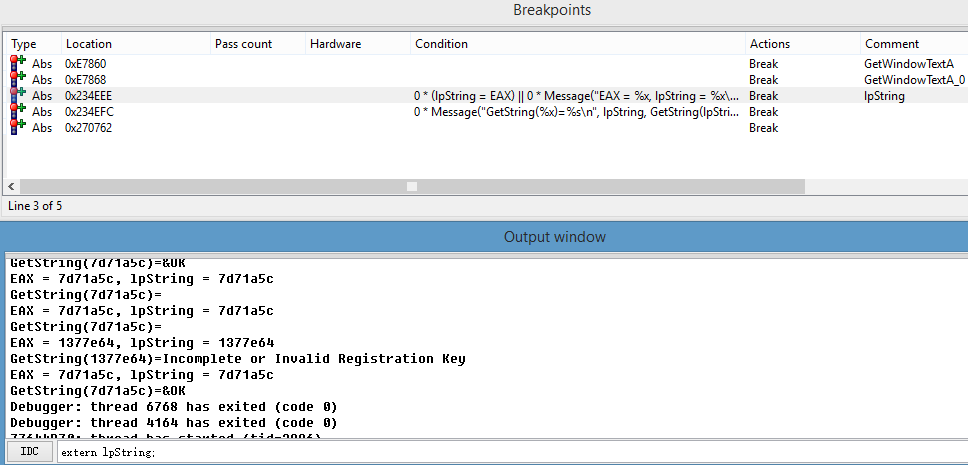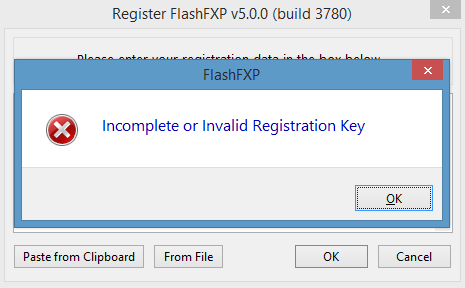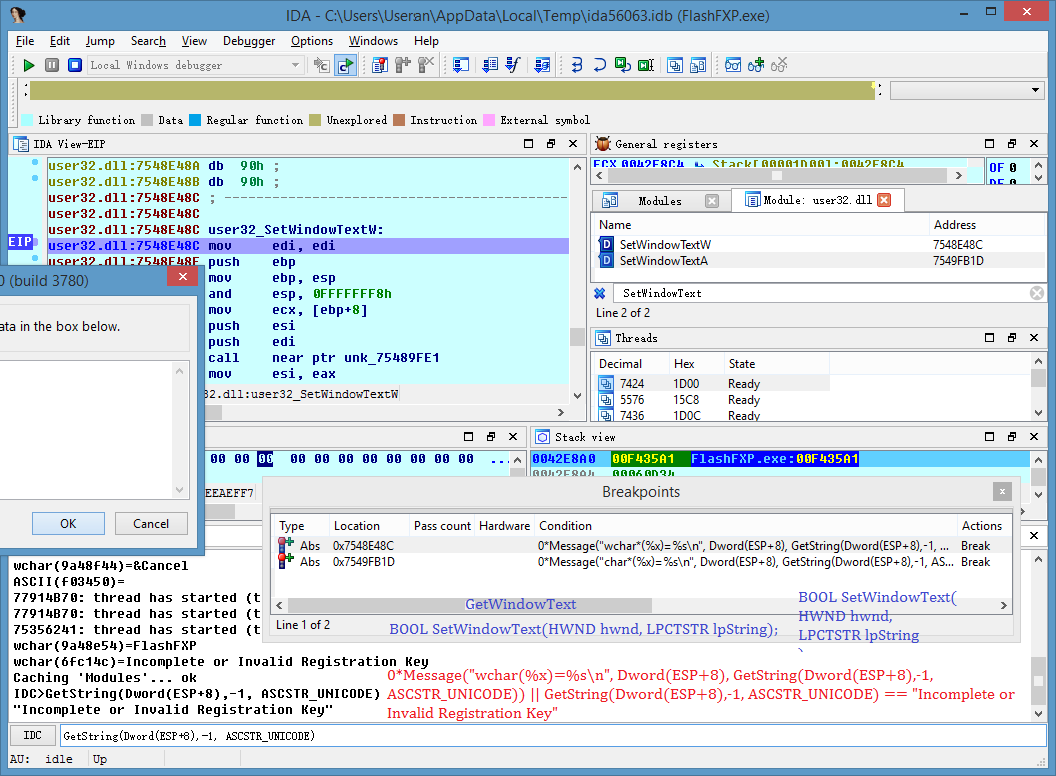一、断点
调试很重要一点是下断点,看看IDA提供的功能,本来已经和WinDbg一样强了。
官方文档的变化
Edit breakpoint
Action name: BreakpointEdit
Condition(6.5及之前版本)
This IDC expression will be evaluated each time the breakpoint is reached. If the expression returns true, the debugger will execute the selected actions. Please note that you can use the register names in the IDC scripts when the debugger is active. Tests like this would be ok, for example: EAX == EBX+5 or Dword(ESP+0x10) == 34
Condition(6.6版本开始)
This IDC expression will be evaluated each time the breakpoint is reached. If the expression returns true (non-zero), the debugger will execute the selected actions. Please note that you can use the register names in the IDC scripts when the debugger is active. Tests like this are allowed, for example: EAX == EBX+5 or Dword(ESP+0x10) == 34
You can also use the "..." button to enter a multiline condition, or specify
another scripting language to use. See here for
more info.
Breakpoint conditions |
You can use the "Condition" field of the breakpoint properties to enter an expression which is evaluated when the breakpoint is hit. It can be either an actual condition or just any valid code in IDC or another supported scripting language syntax. By using the "..." button, you can open a multi-line editor for the condtition and switch the scripting language used for evaluating it.
Expressions
If you enter an expression, the result will be used to determine whether the selected actions are exectuted. Some examples of IDC expressions:
Check if EAX is equal to 5:
EAX==5
Check if the first argument to the function is 1:
Dword(ESP)==1
Interpret the second argument to the function as a pointer to Unicode string, print it, and return 0 (so that the execution continues immediately):
Message("Filename: %s
", GetString(Dword(ESP+4), -1, ASCSTR_UNICODE)), 0
Set EAX to 0 and continue:
EAX=0,0
Statements
You can enter several statements in the multi-line editor. If the last one is a 'return' statement, it is used as the result of the condition. Otherwise the condition is assumed to return 0.
可以看出新变化,支持多行编辑了,更好更方便更加强大。举得例子也让我想起逗号表示式了,也就是不断点打印日志可以使用这种方式。
逗号表达式表达式1,表达式2,表达式3,...... ,表达式n逗号表达式的要领:(1) 逗号表达式的运算过程为:从左往右逐个计算表达式。(2) 逗号表达式作为一个整体,它的值为最后一个表达式(也即表达式n)的值。(3) 逗号运算符的优先级别在所有运算符中最低。如:(3+5,6+8)的值是14,(a=3*5,a*4)的值是60。
官方网站更新介绍:https://www.hex-rays.com/products/ida/6.6/,里面有许多改变,这里看编辑条件断点。
Multiline breakpoint conditions
Python users will love this: now it is possible to write a multiline condition right in the 'edit breakpoint' dialog box. IDA even accepts function definitions there!

以前的
1、断点:
参考:自带文档,调试菜单(Debugger submenu)-断点子菜单(Breakpoints submenu)-编辑断点(Edit breakpoint)章节和IDC之表达式(IDC: Expressions)一章
条件断点,可以输入一个IDC表达式,如果在调试状态下可以使用寄存器名字。
Condition
This IDC expression will be evaluated each time the breakpoint is reached. If the expression returns true, the debugger will execute the selected actions. Please note that you can use the register names in the IDC scripts when the debugger is active. Tests like this would be ok, for example: EAX == EBX+5 or Dword(ESP+0x10) == 34
案例1:自定义打印跟踪执行某条语句时的各种值。
Alphabetical list of IDC functions
The following conventions are used in the function descriptions:
'ea' is a linear address 'success' is 0 if a function fails, 1 otherwise 'void' means that function returns no meaningful value (always 0) 'anyvalue' means that function may return value of any type
一个永远返回假的条件表达式:0 * Message("%s = %d ", atoa(Dword(R2+0x10)), R2+0x20)
这里我试过,需要与0相乘,确保假。
远程调试,字符串指针R2+0x10的值是"crack"的表达式
'c' == DbgByte(DbgDword(R2+0x10)) && 'r' == DbgByte(1+DbgDword(R2+0x10)) && 'a' == DbgByte(2+DbgDword(R2+0x10)) && 'c' == DbgByte(3+DbgDword(R2+0x10)) && 'k' == DbgByte(4+DbgDword(R2+0x10))
案例2:根据前一条语句的某些值来对某语句下条件断点。

CODE:00234EC8 loc_234EC8: ; CODE XREF: sub_234DD8+CB↑j CODE:00234EC8 mov eax, edi CODE:00234ECA call sub_193ED4 CODE:00234ECF push eax ; hWnd CODE:00234ED0 call GetWindowTextLengthW CODE:00234ED5 mov edx, eax CODE:00234ED7 inc edx CODE:00234ED8 mov eax, esi CODE:00234EDA call sub_E48AC CODE:00234EDF mov eax, [esi] CODE:00234EE1 call sub_E4544 CODE:00234EE6 push eax ; nMaxCount CODE:00234EE7 mov eax, [esi] CODE:00234EE9 call sub_E4534 CODE:00234EEE push eax ; lpString 压入第二参数,缓冲区指针地址,可利用条件断点保存EAX值 CODE:00234EEF mov eax, edi CODE:00234EF1 call sub_193ED4 CODE:00234EF6 push eax ; hWnd CODE:00234EF7 call GetWindowTextW CODE:00234EFC mov eax, [esi] ; 执行完GetWindowTextW后在这里利用条件断点查看缓冲区 CODE:00234EFE call sub_E4544 CODE:00234F03 mov edx, eax CODE:00234F05 dec edx CODE:00234F06 mov eax, esi CODE:00234F08 call sub_E48AC

在执行完GetWindowTextW想看里的内容或者根据lpString来下条件断点。可以这样:
1、在IDA底部的IDC命令行声明一个全局变量:extern lpString;
2、在CODE:00234EEE处下表达式始终为假的条件断点:0 * (lpString = EAX) || 0 * Message("EAX = %x, lpString = %x ", EAX, lpString)
3、在CODE:00234EFC处下条件断点,表达式为:0 * Message("GetString(Address_%x)=%s ", lpString, GetString(Dword(lpString),-1, ASCSTR_UNICODE))
结果打印类似如下:
EAX = 7d71a5c, lpString = 7d71a5c
GetString(Address_7d71a5c)=
EAX = 7d5ebb4, lpString = 7d5ebb4
GetString(Address_7d5ebb4)=
在IDA底部的IDC命令行输入lpString执行,查看lpString,嗯起作用了
IDC>lpString
131460020. 7D5EBB4h 765365664o 00000111110101011110101110110100b '措'
在CODE:00234EFC处下条件断点,表达式为:
0 * Message("GetString(%x)=%s ", lpString, GetString(lpString,-1, ASCSTR_UNICODE))
EAX = 7d71a5c, lpString = 7d71a5c
GetString(7d71a5c)=
EAX = 1377e64, lpString = 1377e64
GetString(1377e64)=Incomplete or Invalid Registration Key
EAX = 7d71a5c, lpString = 7d71a5c
GetString(7d71a5c)=&OK

字符串比较断点:
断点地址 User32.dll BOOL SetWindowText(HWND hwnd,LPCTSTR lpString);
断点条件 0*Message("wchar(%x)=%s ", Dword(ESP+8), GetString(Dword(ESP+8),-1, ASCSTR_UNICODE)) || GetString(Dword(ESP+8),-1, ASCSTR_UNICODE) == "Incomplete or Invalid Registration Key"
其中,逻辑||前为打印调用的历史记录。

2、程式化下条件断点
见文档Breakpoint handling functions一章
// Set breakpoint condition // address - any address in the breakpoint range // cnd - breakpoint condition // is_lowcnd- 0:regular condition,1:low level condition // Returns: success success SetBptCndEx(long ea, string cnd, long is_lowcnd); #define SetBptCnd(ea, cnd) SetBptCndEx(ea, cnd, 0)
Debugger: control
*********************************************** Execute one instruction in the current thread. Other threads are kept suspended. // NOTE You must call GetDebuggerEvent() after this call in order to find out what happened. Normally you will get the STEP event but other events are possible (for example, an exception might occur or the process might exit). This remark applies to all execution control functions. The event codes depend on the issued command. returns: successsuccess StepInto(void);
IDA 5.2持调试器除了支持以往的事件的模型,还允许设计一个顺序
执行(线性模型)的IDC 脚本来控制调试器。以往的基于事件的模型依然可用,同时也可通过使
用 get_debugger_event()这个函数来支持简单的线性模型。这个函数暂停插件(或脚本)
的执行直到一个新的调试器时间发生。使用者可以指定他是只对进程挂起事件感兴趣或是对
所有事件。也可以进行定时设置,如果没有其它事件发生,超时后程序可以继续执行。
#include <idc.idc> //-------------------------------------------------------------------------- static main() { auto code, bptea_some_addrese; AppBpt(bptea_some_addrese); // 在某地址下断点 StartDebugger("","",""); // 调试start debugger with default params code = GetDebuggerEvent(WFNE_SUSP, -1); // 等待断点发生... and wait for bpt if ( code <= 0 ) return Failed(code); Message ("Stopped at %a, event code is %x ", GetEventEA(), GetEventId()); // 打印消息 StepInto(); // 扮演跟进行动 request a single step GetDebuggerEvent(WFNE_SUSP, -1); // ... and wait for app to execute StepInto(); // request a single step GetDebuggerEvent(WFNE_SUSP, -1); // ... and wait for app to execute DelBpt(bptea); } //-------------------------------------------------------------------------- // Print an failure message static Failed(code) { Warning("Failed, sorry (code %d)", code); return 0; }
UUNP 解压器插件的核心功能
http://blog.csdn.net/eqera/article/details/8239505
#include <idc.idc> //-------------------------------------------------------------------------- static main() { auto ea, bptea, tea1, tea2, code, minea, maxea; auto r_esp, r_eip, caller, funcname; // Calculate the target IP range. It is the first segment. // As soon as the EIP register points to this range, we assume that // the unpacker has finished its work. tea1 = FirstSeg(); tea2 = SegEnd(tea1); // Calculate the current module boundaries. Any calls to GetProcAddress // outside of these boundaries will be ignored. minea = MinEA(); maxea = MaxEA(); // Launch the debugger and run until the entry point if ( !RunTo(BeginEA()) ) return Failed(-1); // Wait for the process to stop at the entry point code = GetDebuggerEvent(WFNE_SUSP, -1); if ( code <= 0 ) return Failed(code); // Set a breakpoint at GetProcAddress bptea = LocByName("kernel32_GetProcAddress"); if ( bptea == BADADDR ) return Warning("Could not locate GetProcAddress"); AddBpt(bptea); while ( 1 ) { // resume the execution and wait until the unpacker calls GetProcAddress code = GetDebuggerEvent(WFNE_SUSP|WFNE_CONT, -1); if ( code <= 0 ) return Failed(code); // check the caller, it must be from our module r_esp = GetRegValue("ESP"); caller = Dword(r_esp); if ( caller < minea || caller >= maxea ) continue; // if the function name passed to GetProcAddress is not in the ignore-list, // then switch to the trace mode funcname = GetString(Dword(r_esp+8), -1, ASCSTR_C); // ignore some api calls because they might be used by the unpacker if ( funcname == "VirtualAlloc" ) continue; if ( funcname == "VirtualFree" ) continue; // A call to GetProcAddress() probably means that the program has been // unpacked in the memory and now is setting up its import table break; } // trace the program in the single step mode until we jump to // the area with the original entry point. DelBpt(bptea); EnableTracing(TRACE_STEP, 1); for ( code = GetDebuggerEvent(WFNE_ANY|WFNE_CONT, -1); // resume code > 0; code = GetDebuggerEvent(WFNE_ANY, -1) ) { r_eip = GetEventEa(); if ( r_eip >= tea1 && r_eip < tea2 ) break; } if ( code <= 0 ) return Failed(code); // as soon as the current ip belongs OEP area, suspend the execution and // inform the user PauseProcess(); code = GetDebuggerEvent(WFNE_SUSP, -1); if ( code <= 0 ) return Failed(code); EnableTracing(TRACE_STEP, 0); // Clean up the disassembly so it looks nicer MakeUnknown(tea1, tea2-tea1, DOUNK_EXPAND|DOUNK_DELNAMES); MakeCode(r_eip); AutoMark2(tea1, tea2, AU_USED); AutoMark2(tea1, tea2, AU_FINAL); TakeMemorySnapshot(1); MakeName(r_eip, "real_start"); Warning("Successfully traced to the completion of the unpacker code " "Please rebuild the import table using renimp.idc " "before stopping the debugger"); } //-------------------------------------------------------------------------- // Print an failure message static Failed(code) { Warning("Failed to unpack the file, sorry (code %d)", code); return 0; }
二、搜索
addr = FindBinary(0, SEARCH_DOWN, "31 32 33 34 35 36 37 38 39"); #ea = FindText(ea, SEARCH_NEXT | SEARCH_REGEX, 0, 0, "test *[a-zA-Z]*, +[a-zA-Z]*") MinEA() 等价于 GetLongPrm(INF_MIN_EA) 而INF_MIN_EA // int32; The lowest address used // in the program // IDC>auto ea_result = FindText(MinEA() ,SEARCH_DOWN|SEARCH_NEXT, 0, 0, "478467622"); Message("%s %x ", BADADDR == ea_result ? "bad" : "ok", ea_result); bad ffffffff //查找mov dword ptr [eax+1Ch], offset sub_11010类似这种形式的指令 IDC>auto ea = 0; ea = FindText(ea, SEARCH_DOWN |SEARCH_NEXT | SEARCH_REGEX, 0, 0, "mov +dword ptr \[[a-zA-Z]+\+[a-zA-Z0-9_ ]+h\],[a-zA-Z0-9_ ]*"); Message("Find in %x ", ea); if(BADADDR != ea) {auto op2_addr = GetOperandValue(ea,1); Message("op2 address is %x ", op2_addr);} Find in 30801855 //双击这里自动定位代码 op2 address is 24